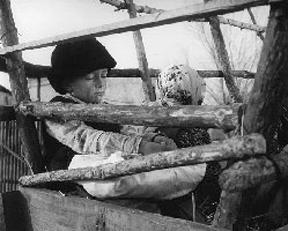

[Little Angel] tells an intimate story within the larger historical context of the deportation of ethnic Germans from Turkmenistan to Siberia during the Second World War. The opening shots—laughing children running through a poppy field, a dog chasing a turtle—are the closing moments of a childhood paradise. When the children arrive back at their village they find their alarmed parents, men in uniforms, and several wagons. A Red Army officer gives the order: "children under 16 and nursing mothers will remain in the village. Everyone else is subject to deportation."… The full horror of the event becomes clear only when all the adults have been carted away, and the children, like stray dogs, corralled into an orphanage. The village is left in absolute silence and abandoned except for a young woman named aunt Liza, her nine-year-old daughter, Amaliia, her nursing baby, an old woman named mama Berta, and a few kids who managed to avoid the "round-up."
One such child, Georg, climbs a tree and builds a miniature nest in hope that a "little angel" will provide for him, as promised in a traditional German Easter song: "Little angel, bring me joy, give me something good to eat so I might fly into the sky with you." Georg's companion is a Turkmen boy named Orazka, who has no concept of death and so greets news of funerals with joy, since they are preceded by wakes at which everyone eats. Orazka invites Georg to the Turkmen village to partake in a funeral feast, but the village is separated from the German settlement by a rickety bridge over a swift river. With his bowl in his teeth, Georg crawls across the bridge and reaches the Turkmen village…
The filmmakers' use of images is amazing: two distinct worlds in one place. On one side of the river are whitewashed German houses, on the other, Turkmen yurts, horse posts, and temporary livestock corrals. The camera seems to breathe as it moves from one landscape to the next. The only ones for whom there are no boundaries are the children…
Saparov's historical narrative touches on one of the most complex questions for the modern "little person," the question of "motherland": "what does Turkmenistan mean to the Germans, and what do the Germans mean to Turkmenistan?"… The little German boy represents the image of the non-Asian in Asia…. Multi-ethnic Central Asia has always been a "cauldron of peoples" in which old ethic groups disappear and new ones arise. For centuries, different tribes, nationalities, and races have lived side by side, to the mutual enrichment of all. Saparov's film depicts two such peoples, profoundly different in culture and worldview, but nevertheless mutually tolerant and beneficial to one another; the director underscores the point that it is politics that drives people apart…
...If I had to name the ten best films of all time, world-wide, Sarapov's Little Angel, Bring Me Joy would without a doubt be on the list.
-- Gul'nara Abikeeva, Kino tsentral'noi Azii (Almaty, 2001), 164-66.
Usman Saparov was born in 1938. He trained as a camera operator at the All-Union State Filmmaking Institute (VGIK) in Moscow from 1958 to 1963. His film Little Angel, Bring Me Joy won the grand prize at the 1994 Open Russian Film Festival (Kinotavr) in Sochi and the Peace Prize at the 1993 Chicago Children's Festival, in addition to over a dozen other festival honors. In recent years he has worked mostly as a director and scriptwriter of children's films and television programs, including the Russian-language version of Sesame Street.
| 1979 | The Little Camel |
| 1982 | Male Education |
| 1985 | Adventures in the Small Islands |
| 1987 | Mad Woman |
| 1990 | Khalima |
| 1992 | Little Angel, Bring Me Joy |
| 1993 | Karakum |
| 1997-2000 | Sesame Street (Ulitsa sezam) (TV) |
| 2000 | Stairway to Heaven (TV) |